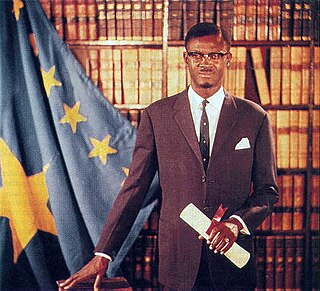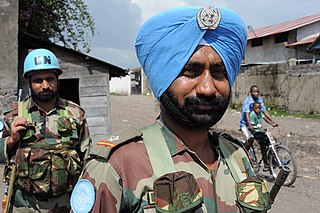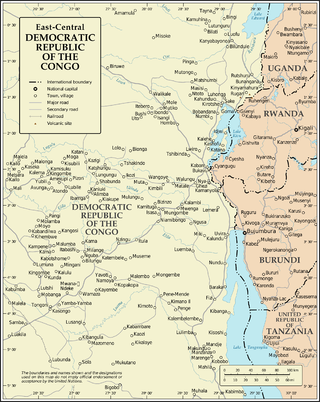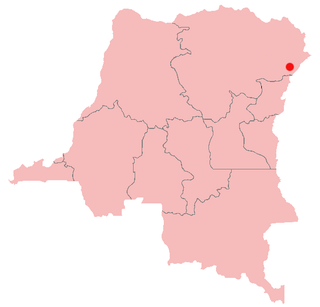
The United Nations Organization Stabilization Mission in the Democratic Republic of the Congo, or MONUSCO, is a United Nations peacekeeping force in the Democratic Republic of the Congo (DRC). A planned withdrawal from the country is currently on indefinite hold due to the unstable security situation.
Chapter VII of the United Nations Charter sets out the UN Security Council's powers to maintain peace. It allows the Council to "determine the existence of any threat to the peace, breach of the peace, or act of aggression" and to take military and nonmilitary action to "restore international peace and security".
United Nations Security Council Resolution 143 was adopted on July 14, 1960. With Congolese requests for assistance in front of him, following the Mutiny of the Force Publique, Secretary-General of the United Nations Dag Hammarskjöld had called a meeting for the evening of July 13, acting under Article 99 of the Charter. After the Secretary-General's report and a request for military assistance by the President and Prime Minister of the Republic of the Congo (Leopoldville) to protect its territory, the Council called upon Belgium to withdraw its troops from the territory and authorized the Secretary-General to take the necessary steps to provide the Government with such military assistance that the national security forces may be able to meet fully their tasks. The Council asked the Secretary General to report to the Security Council as appropriate.

United Nations Security Council Resolution 145 was adopted unanimously on 22 July 1960. After considering a report by the Secretary-General, Dag Hammarskjöld, regarding the implementation of Resolution 143, the Council called upon Belgium to withdrawal its troops from the Congo and authorized the Secretary-General to take all necessary action to this effect. The Council further requested all states to refrain from any action which might impede the restoration of law and order in the Congo or undermine its territorial integrity, the Council then commended the Secretary-General for his prompt action in regard to Resolution 143 along with his first report and requested further reports be made as appropriate.

United Nations Security Council Resolution 161 was adopted on February 21, 1961. After noting the killings of Patrice Lumumba, Maurice Mpolo and Joseph Okito and a report of the Secretary-General's Special Representative, the Council urged the United Nations to immediately take measures to prevent the occurrence of civil war in the Congo, even if the use of force is necessary. The Council further urged the withdrawal of all Belgian and other foreign military, paramilitary personnel and mercenaries not with the UN and called upon all states to take measures to deny transport and other facilities to such personnel moving into the Congo. The Council also decided that it would launch an investigation into the death of Lumumba and his colleagues promising punishment to the perpetrators.

United Nations Security Council Resolution 1919, adopted unanimously on April 29, 2010, after recalling resolutions 1674 (2006), 1894 (2009) on the protection of civilians in armed conflict, 1612 (2005) and 1882 (2009) on children in armed conflict, 1502 (2003) on the protection of humanitarian and United Nations personnel, and 1325 (2000), 1820 (2008), 1888 (2009), and 1889 (2009) on women, peace, and security, the Council extended the mandate of the United Nations Mission in Sudan (UNMIS) until April 30, 2011 with the intention of renewing it further if necessary.

United Nations Security Council Resolution 1925, adopted unanimously on May 28, 2010, after reaffirming previous resolutions on the situation in the Democratic Republic of the Congo, the Council extended the mandate of the United Nations Mission in the Democratic Republic of Congo (MONUC) until June 30, 2010, authorised a withdrawal of 2,000 troops and decided that from July 1, 2010, MONUC would be known as the United Nations Organization Stabilization Mission in the Democratic Republic of the Congo (MONUSCO) with a mandate until June 30, 2011.
United Nations Security Council resolution 1291, adopted unanimously on 24 February 2000, after recalling resolutions 1234 (1999), 1258 (1999), 1273 (1999) and 1279 (1999) on situation in the Democratic Republic of the Congo, the Council expanded the United Nations Mission in the Democratic Republic of Congo (MONUC) to include additional tasks and extended its mandate until 31 August 2000.

United Nations Security Council Resolution 1417 extended the mandate of the United Nations Organisation Mission in the Democratic Republic of Congo (MONUC) until 30 June 2003. It was unanimously adopted by the United Nations Security Council on 14 June 2002, at its 4,554th meeting. Resolution 1417 was passed after the security council recalled its previous resolutions regarding the matter, particularly Resolution 1355 (2001).

United Nations Security Council resolution 1445 was adopted unanimously on 4 December 2002. After recalling all previous resolutions on situation in the Democratic Republic of the Congo, the council expanded the military component of the United Nations Mission in the Democratic Republic of Congo (MONUC) to a level of 8,700 military personnel–up from 4,250–in two task forces.

United Nations Security Council Resolution 1484, adopted unanimously on 30 May 2003, after recalling previous resolutions on the situation in the Democratic Republic of the Congo, the Council authorised Operation Artemis in Bunia, the capital of Ituri Province, amid the deteriorating security situation in the area.

United Nations Security Council resolution 1493, adopted unanimously on 28 July 2003, after recalling all resolutions on the situation in the Democratic Republic of the Congo, the council extended the mandate of the United Nations Mission in the Democratic Republic of Congo (MONUC) until 30 July 2004 and raised its troop level from 8,700 to 10,800.

United Nations Security Council Resolution 1545, adopted unanimously on 21 May 2004, after recalling all resolutions on the situation in Burundi, particularly Resolution 1375 (2001), the council established the United Nations Operation in Burundi (ONUB) to bring about peace and national reconciliation in the country.

United Nations Security Council resolution 1565, adopted unanimously on 1 October 2004 after recalling all previous resolutions on the situation in the Democratic Republic of the Congo, extended the mandate of the United Nations Mission in the Democratic Republic of Congo (MONUC) until 31 March 2005 and authorised an additional deployment of 5,900 troops and police. It reaffirmed the commitment to respect the “sovereignty, territorial integrity and political independence [sic]” of Congo and States in the region.

United Nations Security Council Resolution 1592, adopted unanimously on 30 March 2005, after recalling all previous resolutions on the situation in the Democratic Republic of the Congo, including Resolution 1565 (2004), the Council extended the mandate of the United Nations Mission in the Democratic Republic of Congo (MONUC) until 1 October 2005.

United Nations Security Council Resolution 1649, adopted unanimously on 21 December 2005, after recalling all previous resolutions on the situation in the Democratic Republic of the Congo, including resolutions 1533 (2004), 1565 (2004), 1592 (2005), 1596 (2005) and 1616 (2005), 1621 (2005) and 1628 (2005), the council extended and expanded sanctions against the country until 31 July 2006, and demanded that foreign fighters disarm or face sanctions.
United Nations Security Council Resolution 1671, adopted unanimously on April 25, 2006, after recalling previous resolutions concerning the situation in the Democratic Republic of the Congo, particularly resolutions 1565 (2004), 1592 (2005), 1621 (2005) and 1635 (2005), the Council authorised the deployment of the European Union's EUFOR RD Congo force to assist the United Nations Mission in the Democratic Republic of the Congo (MONUC) during the 2006 general elections.

United Nations Security Council Resolution 1738, adopted unanimously on December 23, 2006, after reaffirming resolutions 1265 (1999), 1296 (2000), 1502 (2003) and 1674 (2006) on the protection of civilians in armed conflict, the Council condemned attacks against journalists in conflict situations. It was the last resolution adopted by the Security Council in 2006.
United Nations Security Council Resolution 1794 was unanimously adopted on 21 December 2007.
Operation Rum Punch or Operation Rampunch was a military action undertaken by United Nations peacekeeping forces on 28 August 1961 against the military of the State of Katanga, a secessionist state from the Republic of the Congo in central Africa. UN troops arrested 79 foreign mercenaries and officers employed by Katanga with little conflict.












